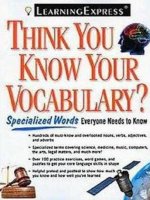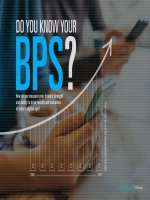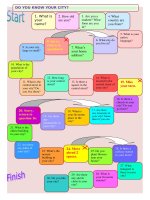think you know your vocabulary
Bạn đang xem bản rút gọn của tài liệu. Xem và tải ngay bản đầy đủ của tài liệu tại đây (1.77 MB, 287 trang )
THINK YOU KNOW
YOUR VOCABULARY?
Specialized Words Everyone Needs to Know
NEW YORK
®
Think_00_i-x.qxd:Essentials style 4/22/09 12:48 PM Page iii
Copyright © 2009 Learning Express, LLC.
All rights reserved under International and Pan-American Copyright
Conventions. Published in the United States by LearningExpress, LLC,
New York.
Library of Congress Control Number: 2009926366
A copy of this title is on file with the Library of Congress.
ISBN: 978-1-57685-687-1
Printed in the United States of America
9 8 7 6 5 4 3 2 1
For more information or to place an order, contact LearningExpress at:
2 Rector Street
26th Floor
New York, NY 10006
Or visit us at:
www.learnatest.com
Think_00_i-x.qxd:Essentials style 4/22/09 12:48 PM Page iv
v
CONTENTS
Introduction: The Top 20 Reasons Why You—Yes,
You—Need a Better Vocabulary v
Pretest: How Much Do You Know? 1
PART ONE Vocabulary Boot Camp: Just the Basics 7
Day 1 Person, Place, or Thing? Commonly Used Nouns 9
Day 2 It’s Alive! Vivid, Vibrant Verbs 17
Day 3 Coming Close: Studying Synonyms 25
Day 4 When Opposites Attract: Awesome Antonyms 33
Day 5 What’s the Difference? Handling Homophones 39
Day 6 Make It Real: Adding Adjectives 49
Day 7 Make It Real—Again: Time for Adverbs 57
Think_00_i-x.qxd:Essentials style 4/22/09 12:48 PM Page v
CONTENTS
vi
PART TWO In No Uncertain Terms: Specialized
Vocabularies Everyone Needs to Know 63
Day 8 How Are You Feeling Today? Emotional Terms 65
Day 9 Just the Facts, Ma’am: Mathematical Terms 71
Day 10 Name That Tune: Musical Terms 77
Day 11 On the Hunt: Job Search Terms 83
Day 12 Sign on the Dotted Line: Contract Terms 91
Day 13 Politics on Parade: Political Terms 97
Day 14 The Weather Report: Meteorological Terms 103
Day 15 Where in the World? Geographical Terms 109
Day 16 Pieces and Parts: Mechanical Terms 115
Day 17 Patron of the Arts: Humanities Terms 121
Day 18 In the Doctor’s Office: Medical Terms 127
Day 19 The World Wide Web: Computer Terms 133
Day 20 Does It Take Batteries? Electronic Terms 139
Day 21 The Right Time and Place: Historical Terms 145
Day 22 What’s Cookin’? Culinary Terms 151
Day 23 If You Build It: Construction Terms 157
Day 24 Order in the Court: Legal Terms 163
Day 25 Between Your Ears: Psychological Terms 169
Day 26 It’s a Science: Scientific Terms 175
Day 27 People-Watching: Anthropological Terms 181
Day 28 Play Ball! Sports Terms 187
Day 29 You Design It: Interior Design Terms 193
Day 30 School Days: Educational Terms 199
Posttest: How Much Do You Know Now? 205
Answers 211
Think_00_i-x.qxd:Essentials style 4/22/09 12:48 PM Page vi
vii
INTRODUCTION
The Top 20 Reasons Why You—Yes, You—
Need a Better Vocabulary
E
veryone needs a strong, extensive vocabulary.
Why, you ask? Simply put, a good vocabulary is something that you’ll
use every single day, in one way or another. You’ll meet people all the time who
use specialized words, and if you don’t understand them, you may be the one to
pay the price. Take a look at the following top 20 reasons for developing a strong
vocabulary. You’ll probably find yourself in there somewhere.
Having an extensive vocabulary will help you to:
1. do better in school, from taking tests to writing papers. Better grades
mean better colleges, better resumes, and better job opportunities. In the
end, that can mean a better income and ultimately, more money!
2. impress teachers, bosses, friends, parents, mentors, and other relevant
people.
3. understand more quickly and easily any materials you’re given in school or
on the job.
Think_00_i-x.qxd:Essentials style 4/22/09 12:48 PM Page vii
INTRODUCTION
viii
4. express your emotions and thoughts in a more articulate and accurate way.
5. be less likely to have people catch you off guard when they use words that
are unfamiliar to you.
6. communicate easily with a wider variety of people.
7. most likely score higher on tests like the ACT or SAT; higher scores may
mean more college opportunities.
8. ace magazine and newspaper quizzes and puzzles.
9. improve your overall self-confidence.
10. avoid feeling lost or confused when talking to experts in different fields.
11. watch PBS documentaries and History Channel shows without running
for a dictionary.
12. fill up your conversations with more interesting words or phrases than
like, you know, and whatever.
13. avoid being left out of conversations because you’re struggling to figure
out what a certain word means.
14. better formulate your ideas, goals, and plans when speaking or writing
about them.
15. improve the quality of your letters, memos, e-mails, and maybe even your
text messages!
16. read faster because you won’t be slowed down by having to decipher, skip
over, or look up unfamiliar words.
17. give stronger, more persuasive speeches whether going for a good grade,
convincing your boss to give you a raise, or persuading your parents to let
you have a new mp3 player.
18. understand the world better because you’ll have a stronger knowledge of
what’s going on around you.
19. keep up with your favorite TV shows because you’ll finish your homework
faster.
20. race through this book, laughing maniacally because you know every single
word in it!
A word about these words: The first thing to know is that almost all of the
words are officially considered to be at the eleventh-grade level and up. Some of
the words may have more actual definitions than are included here. You’ll
mostly find the main definitions of words as they are used in normal conversa-
tion, but feel free to look up additional ones at your leisure.
Think_00_i-x.qxd:Essentials style 4/22/09 12:48 PM Page viii
INTRODUCTION
ix
DO Try This at Home
Think your vocabulary is just fine? Try this simple experiment. For the next
seven days, every time you read or hear a word you can’t easily define, write it
down. This includes words you hear on television as well as in conversations
at home, school, and work. Write down any word you find in your textbooks,
newspapers, books, magazines, or on the Internet that you can’t easily define.
When you’re finished, you may be surprised at how many words you come
across on a daily basis that, if you had to define, you couldn’t!
Think_00_i-x.qxd:Essentials style 4/22/09 12:48 PM Page ix
Think_00_i-x.qxd:Essentials style 4/22/09 12:48 PM Page x
1
PRETEST: HOW MUCH
DO YOU KNOW?
B
efore you begin reading and learning all the
new words in this book, test the strength of your vocabulary as it stands
right now. This pretest gives you examples of words you’ll find in each lesson.
Good luck!
Read each statement below and circle the correct answer.
1. The word faction refers to a
a. body part.
b. clique.
c. political party.
d. equation.
2. To add decoration or embellishments to something is to
a. admonish it.
b. chastise it.
c. garnish it.
d. redress it.
Think_01_001-062.qxd:Essentials style 4/22/09 12:51 PM Page 1
THINK YOU KNOW YOUR VOCABULARY?
2
3. A more descriptive word for pretty is
a. accoutrement.
b. belligerent.
c. gregarious.
d. winsome.
4. Someone who is laconic tends to be
a. terse.
b. wealthy.
c. attractive.
d. polite.
5. A person who is admired or worshipped is known as
a. an idle.
b. an idol.
c. an idyll.
d. idyllic.
6. A nebulous answer is one that is
a. negative.
b. gruesome.
c. offensive.
d. confusing.
7. To behave ignominiously is to act
a. dishonorably.
b. anxiously.
c. logically.
d. consistently.
8. A truly miserable person is
a. credulous.
b. bellicose.
c. disconsolate.
d. zealous.
Think_01_001-062.qxd:Essentials style 4/22/09 12:51 PM Page 2
PRETEST: HOW MUCH DO YOU KNOW?
3
9. The distance around a circle is the
a. circumference.
b. diameter.
c. denominator.
d. equation.
10. A maestro is a
a. teacher.
b. author.
c. conductor.
d. officer.
11. Another word for C.V., or curriculum vitae, is
a. reference.
b. recommendation.
c. resignation.
d. resume.
12. The small statements at the bottom of a contract renouncing legal rights
are called
a. disclaimers.
b. defaults.
c. collateral.
d. liabilities.
13. An anarchist believes that governments should be
a. expanded.
b. abolished.
c. revered.
d. followed.
14. When temperatures rise with increased elevation, it is an example of
a. evaporation.
b. precipitation.
c. inversion.
d. condensation.
Think_01_001-062.qxd:Essentials style 4/22/09 12:51 PM Page 3
THINK YOU KNOW YOUR VOCABULARY?
4
15. Half of the globe is called
a. a biosphere.
b. an isthmus.
c. a hemisphere.
d. a meridian.
16. A joule is a unit of
a. electricity.
b. inductance.
c. temperature.
d. energy.
17. A moment of insight is known as
a. a hubris.
b. an epiphany.
c. a melodrama.
d. an omniscience.
18. Keratin is found in
a. fingernails.
b. clothing.
c. vegetables.
d. medicine.
19. Spam
®
is the name of a meat product, but spam can also refer to
a. snail mail.
b. television commercials.
c. unwanted e-mails.
d. instant messaging.
20. Xenon is a type of
a. gas.
b. alien.
c. planet.
d. metal.
Think_01_001-062.qxd:Essentials style 4/22/09 12:51 PM Page 4
PRETEST: HOW MUCH DO YOU KNOW?
5
21. Another word for armistice is
a. peace.
b. happiness.
c. love.
d. hope.
22. Bread that is unleavened doesn’t
a. bake.
b. taste good.
c. rise.
d. contain wheat.
23. Bonding two or more layers of materials together is known as
a. merging.
b. laminating.
c. infiltrating.
d. partitioning.
24. A writ is
a. an attorney’s fee.
b. a witness’s testimony.
c. a jury’s verdict.
d. a judge’s order.
25. Having a stigma is considered
a. physically painful.
b. temporarily frightening.
c. socially unacceptable.
d. emotionally amusing.
26. An antioxidant is a substance that might help people fight
a. Alzheimer’s.
b. cancer.
c. Parkinson’s.
d. acne.
Think_01_001-062.qxd:Essentials style 4/22/09 12:51 PM Page 5
THINK YOU KNOW YOUR VOCABULARY?
6
27. A matriarchy is a system that is run by
a. priests.
b. men.
c. dictators.
d. women.
28. A switch-hitter plays the game of
a. baseball.
b. football.
c. soccer.
d. basketball.
29. A certain style of couch is called
a. a valance.
b. an armoire.
c. a patina.
d. a settee.
30. Someone who is bilingual is
a. able to speak in two different languages.
b. allowed to have residency in two countries.
c. born in one country but living in another.
d. trained to speak English as a primary language.
Think_01_001-062.qxd:Essentials style 4/22/09 12:51 PM Page 6
7
PART
ONE
VOCABULARY
BOOT CAMP:
JUST THE BASICS
Think_01_001-062.qxd:Essentials style 4/22/09 12:51 PM Page 7
Think_01_001-062.qxd:Essentials style 4/22/09 12:51 PM Page 8
9
DAY
1
I
f you’ve ever played 20 Questions, you’ve heard
people ask, “person, place, or thing?” or “animal, vegetable, or mineral?”
While the answer to these questions changes throughout the game, they all have
one thing in common: they are nouns.
Think back to grammar class. You probably remember that a noun is, quite
simply, a person, place, or thing. The dictionary further pins it down as “a word
or group of words used as the name of a class of people, places, or things, or of a
specific person, place, or thing.” Does that help? Need more of an explanation?
Just remember that a noun is something or someone. It’s not an action
(that’s a verb). It doesn’t describe anything (those are adjectives and adverbs).
Many times, a noun is something you can touch, but not always. After all, affec-
tion is a noun and so are faith, courage, dreams, and other things you can’t
touch. These qualify as generic “things” in the definition.
Without nouns, our words and speech wouldn’t make much sense. For
example, imagine leaving this note:
“Going to his with. Returning. Doing quickly.”
PERSON, PLACE,
OR THING?
COMMONLY
USED NOUNS
Think_01_001-062.qxd:Essentials style 4/22/09 12:51 PM Page 9
THINK YOU KNOW YOUR VOCABULARY?
10
Is there a message there? No! The recipient of the note wouldn’t know where
you were going or with whom, when you would return, or what you’re doing.
The definitions of 20 nouns follow; they are arbitrary selections (yes, look
that one up!). A few have more than one definition because they’re typically
used in several ways. Now and then, you’ll spot some with interesting or
unusual comments added. That doesn’t mean the other words are any less inter-
esting. It just means there’s only so much space in this book!
DEFINITIONS
alumnus a person who has attended or has graduated from a particular school
[The plural of alumnus is alumni.]
boycott the process of refusing to deal with a person, organization, or country,
usually to express disapproval or to force acceptance of terms
[This word can act as either a noun or a verb in a sentence.]
charlatan a person who pretends to have more knowledge, skill, or ability than
he or she actually possesses
[The word comes from Italy and is based on people from the village of
Cerreto, most of whom were deemed medical quacks.]
condiment something used to make food tastier, such as mustard, ketchup,
salt, pepper, or other seasonings
Just Be Glad
Be thankful this is a vocabulary book and not a grammar book. If it was,
you’d see instructions on how nouns relate to appositives, articles, pronouns,
compound-possessive forms, infinitives, objective complements, plural pos-
sessives, direct objects, and subordinate clauses. Whew. Don’t you feel lucky
right now?
Pet Peeve
Don’t you just hate it when you look up a word in the dictionary and a form
of the same word is in the definition? It can make you feel like your brain is
going in circles. This book tries not to repeat the word or a version of it in def-
initions so that the meaning is as clear as possible.
Think_01_001-062.qxd:Essentials style 4/22/09 12:51 PM Page 10
PERSON, PLACE, OR THING? COMMONLY USED NOUNS
11
dissertation a long, usually written, thesis or essay on a subject, normally part
of the process for earning a college degree
epoch (1) an event or time that begins a new period of development; (2) a
memorable event, date, or period; (3) a division of geologic time less than a
period and greater than an age
facsimile (1) an exact copy; (2) a system of transmitting and reproducing
printed matter or pictures by means of signals sent over telephone lines
[This is where the word fax comes from, as in “I’m sending you a fax.” The
word is also commonly used as a verb, as in “I’m faxing you a copy right now.”]
faction a group or clique acting together within a larger body, party, govern-
ment, or organization
habitat the place or type of place where a plant or animal naturally or nor-
mally lives or grows; the natural environment of an organism
heretic a person who believes or teaches something opposed to the current
beliefs of the majority; a person who doesn’t conform to any established atti-
tude, doctrine, or principle
iconoclast a breaker or destroyer of images, especially religious ones; a person
who attacks cherished beliefs or traditional institutions as being based on error
or superstition
[Most likely, a heretic and an iconoclast would be good friends—and a lot
of trouble!]
interloper a person who intrudes or interferes wrongly or without reason; a
person who thrusts him- or herself uninvited into the affairs of others
kindred a group of related individuals or a person’s relatives, family, tribe, or race
[This is often shortened to “kin” or “kinfolk” in some communities.]
labyrinth (1) a place full of passageways and blind alleys arranged to make it
difficult to find one’s way around or find the exit; (2) something extremely
complicated or twisting; (3) the bony and membranous part of the internal ear
[In classical mythology, the Labyrinth was a huge maze built in Crete by
Daedalus, under the command of King Minos. It was used to cage the
Minotaur, a creature that was part man, part bull.]
metropolis the chief or capital city of a country, state, or region; any large, busy
city
[In comics and films, this is the name of Superman’s favorite city.]
Think_01_001-062.qxd:Essentials style 4/22/09 12:51 PM Page 11
THINK YOU KNOW YOUR VOCABULARY?
12
nomenclature a system of terms used in a particular science, field of knowl-
edge, or art, especially for the names of plants and animals in biology
pacifist a person who opposes, or is against, war or violence as a means of set-
tling disagreements or whose belief in nonviolence causes him or her to refuse
to go into military service
prodigy (1) an amazing event or action; (2) an unusually talented or gifted child
restoration the act of returning something to its former, original, or normal
condition
symposium (1) a group meeting at which there are several speeches and often
a group discussion; (2) a collection of opinions on a subject
[These things have certainly changed a lot since Greek and Roman times
when the word just meant a big party!]
Activity 1: HIDDEN WORDS
All the vocabulary words from the lesson are hidden in this puzzle. Look across,
down, diagonally, and backward to find them.
R P H T T F R T P I R H C D A O
K R H A B I T A T I F O N O N R
H E R E T I C S P O A L L T P S
T S G R C C N O I T C A F D O A
M T B U H H P T T F S Y R O S T
N O I T A T R E S S I D O N Y E
A R H A R Y A L A I M C N B M I
I A T L L N G E L L I A A R P C
S T N C A R O O C O L D A P O O
N I I N T E R L O P E R S N S H
N O R E A C E R N O P P D A I L
L N Y M N D I F O R L I O N U O
C I B O I R S R C T M E R C M H
O T A N M T N P I E N M I M H C
M S L T D N S U N M U L A P L S
K I N D R E D T Y G I D O R P S
Think_01_001-062.qxd:Essentials style 4/22/09 12:51 PM Page 12
PERSON, PLACE, OR THING? COMMONLY USED NOUNS
13
Activity 2: WORD MATCH
Match each vocabulary word on the left with a word on the right that means
almost the same thing—also known as a synonym (remember that for a later
section).
1. charlatan _____ a. conference
2. facsimile _____ b. genius
3. interloper _____ c. city
4. kindred _____ d. jargon
5. labyrinth _____ e. peacekeeper
6. nomenclature _____ f. intruder
7. symposium _____ g. copy
8. metropolis _____ h. family
9. pacifist _____ i. maze
10. prodigy _____ j. impostor
Activity 3: PICK-A-WORD
Choose the best vocabulary word to complete each sentence.
1. If you and your high school buddies decided to get together after you
graduated, you would host a(n) _______________ party.
2. If you refused to serve a certain kind of chip dip because you discovered
that the company that made it didn’t pay their workers well, you started
your own ______________.
3. Despite the lack of chip dip, you would make sure to serve more than one
______________ for the hot dogs and burgers.
alumnus
boycott
charlatan
condiment
dissertation
epoch
facsimile
faction
habitat
heretic
iconoclast
interloper
kindred
labyrinth
metropolis
nomenclature
pacifist
prodigy
restoration
symposium
Think_01_001-062.qxd:Essentials style 4/22/09 12:51 PM Page 13
THINK YOU KNOW YOUR VOCABULARY?
14
4. To get the party started, you might decide to stand up and read the fantas-
tic _______________ you wrote as part of earning your honors status in
your senior year.
5. Your teacher told you that it was so amazingly well written that a new
______________ has begun in student essays, although he was rolling his
eyes when he said it.
6. Even though everyone at your party would be having fun, there would be
the typical ______________ who would sit in the corner, only interacting
among themselves.
7. You might be tempted to tell them to go back to their own
______________, but you’d just smile and keep playing the part of a
perfect, polite host.
8. There could be a(n) ______________at the party, who doesn’t agree with
anyone else’s attitudes or perspectives.
9. Hopefully, your neighbors wouldn’t call and accuse you of being a(n)
_______________ because you play music that they are opposed to in
principle.
10. After all, you’d be doing such a great job keeping the place from getting
trashed that a(n) ______________ would not be required.
Activity 4: WORD MIX-UP
Unscramble each vocabulary word and write it correctly.
1. chope __________________________
2. taanrachl __________________________
3. sidnoitrates __________________________
4. thataib __________________________
5. pretinlero __________________________
Think_01_001-062.qxd:Essentials style 4/22/09 12:51 PM Page 14
PERSON, PLACE, OR THING? COMMONLY USED NOUNS
15
Activity 5: TRUE OR FALSE?
Read each statement. Write T if it’s true or F if it’s false.
_____ 1. A condiment is something that is added to food to improve the flavor.
_____ 2. The people who go to the same school as you do are known as kindred.
_____ 3. An exact copy of a document or illustration is a facsimile.
_____ 4. Your neighborhood can be referred to as a metropolis.
_____ 5. A pacifist is unlikely to be interested in negotiation.
Think_01_001-062.qxd:Essentials style 4/22/09 12:51 PM Page 15
THINK YOU KNOW YOUR VOCABULARY?
16
Activity 6: CROSS-A-WORD
Read each clue. Write the correct vocabulary word in the puzzle.
Across Down
2 someone opposed to a set of 1 where an animal lives
beliefs 3 an important event or period in
6 a person who breaks and destroys history
images 4 a system of terms for a field of
8 someone not willing to fight about knowledge
things 5 a clique
10 the act of making something look 7 someone who is most
like it did originally unwelcome
11 a person who claims to be 9 relatives, such as aunts, uncles,
something he/she is not and cousins
1
2
3
4
5
6
7
8
9
10
11
Think_01_001-062.qxd:Essentials style 4/22/09 12:51 PM Page 16








